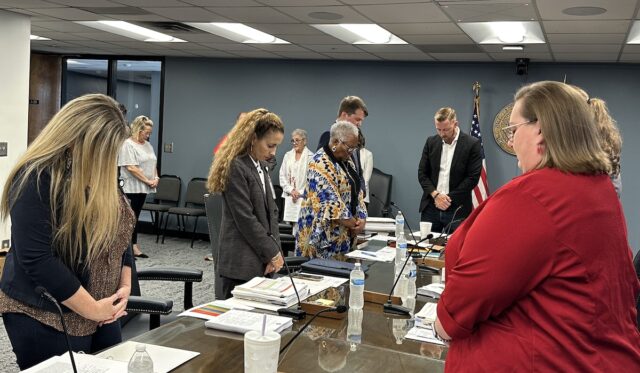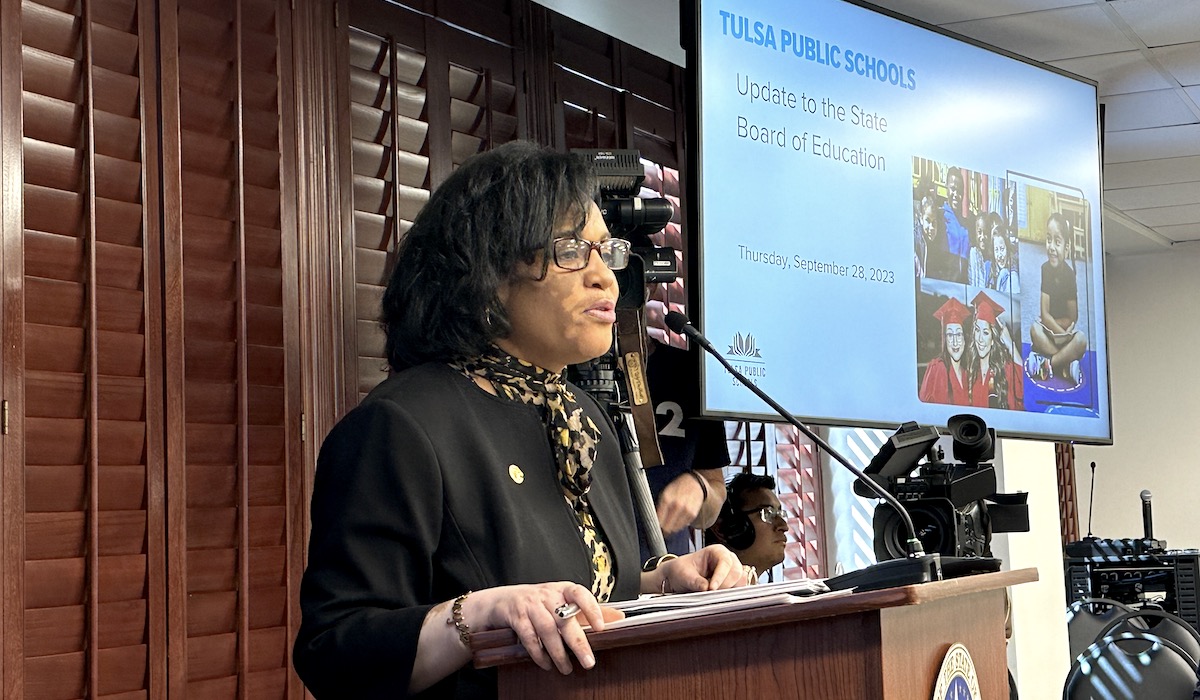

Members of the State Board of Education approved their annual budget request to the Oklahoma Legislature today, a formal but non-binding snapshot of Superintendent of Public Instruction Ryan Walters’ financial priorities for the next fiscal year. Although board members were presented numbers as “net decrease,” several increases in funding were actually part of the request.
Technically, Walters requested about $47.1 million less for the State Department of Education in Fiscal Year 2025 than the agency received this year following a massive funding hike approved in conjunction with new refundable income tax credits for private school and homeschool families. Confusion ensued Thursday, however, after Walters displayed a slide showing $112.9 million of new funding requests followed by the $47.1 million “net decrease” total.
Asked after the meeting where the $47.1 million decrease came from, Walters said the department eliminated some line items, but he declined to give specifics, saying he did not remember the line items sought for elimination.
“There’s some line items we’re not going to continue to request,” Walters said. “There’s a few in the budget. So we’ll have to go back in and dive down into which ones, but there are several that we left out.”
Later Thursday afternoon, Walters’ new communications director, Dan Isett, distributed a press release reminding reporters that about $160 million of the Fiscal Year 2024 appropriation to OSDE was one-time money for three-year pilot programs. Those programs involve grants to districts for school safety needs ($50 million per year for three years) and funding for elementary reading specialists ($3.3 million per year for three years).
“We are being responsive to the fiscal reality in our state and are taking historic action to direct funding toward a singular goal: student outcomes,” Walters was quoted as saying in the press release. “Under my administration, OSDE will be fiscally responsible and maintain a constant eye on the return on investment of taxpayer money. We are maintaining funding levels for classroom instruction and helping to ensure that more money reaches the wallets of teachers around the state.”
‘Move districts to focus on those basics’
Every fall, state agencies compile budget requests to send to the Oklahoma Legislature, but lawmakers are not required to adhere to those requests in any way. For instance, Walters’ previous budget request, which he amended when he took over from his predecessor in January, looked much different from what the Legislature eventually appropriated to the department.
With his new request, Walters proposed $112.9 million of new spending, including $26 million “to fund maternity leave and off-formula teacher pay raises.” The request includes $16.6 million for school employees’ flexible benefit allowance, a cost that increases annually and has been funded in recent years by the Legislature. Walters also listed an $8.25 million increase for “assessments and programs,” as well as a $1.5 million increase for information technology and infrastructure costs.
Walters’ biggest request is $60.5 million for a “Back to the Basics” plan that he said would incorporate “free market principles” to help teachers and students focus on reading, math, science and civics.
Walters said he was launching $8 million of Back to the Basics initiatives Thursday and would be requesting other funding from the Legislature to implement the full plan. Walters did not give details on what was launched today, neither in his remarks to media nor in the subsequent press release.
“When you talk about reading, math, science, history, we have seen indoctrination in our schools, and we’ve also seen programs that have not led to the student outcomes that parents and citizens around the state desire,” Walters said. “We have to do all that we can to move districts to focus on those basics. We have to do all that we can to incentivize excellence in our schools.”
Walters’ desired Back to Basics plan would include a number of line items focused in those core areas as well as an additional $10 million to continue to fund a teacher signing bonus program he announced in April.
According to a document provided to board members, the other items in the plan include:
- Reading initiatives
- $16 million in bonuses for teachers who improve students’ literacy outcomes;
- $10 million to recruit teachers to tutor students;
- Nearly $8 million to train teachers and volunteers in reading instruction;
- $4.5 million to screen and assess student reading ability;
- Math and science initiatives
- $6 million for bonuses for teachers who improve student math outcomes;
- $5 million to recruit teachers to tutor students in math;
- $250,000 to train volunteers in math instruction and screening;
- $150,000 to pay teachers to complete the computer science micro credential;
- Civic education initiatives
- $500,000 for civics training;
- $300,000 for civics training stipends.
Board members approved the request unanimously and largely without comment. Donald Burdick asked some questions before voting in favor of the budget request.
New emergency rule adopted

Citing a recent decision by a Cleveland County District Court judge he called “radical,” Walters proposed a new emergency agency rule concerning gender identity on districts’ student records.
The rule, which the board unanimously adopted, prohibits districts from changing gender on student records from prior years without state board approval. Additionally, the rule requires districts to inform the board of any future court cases or litigation regarding student records and gender identity.
“Just coming from my own background in education and science, and I can say that I am a biologist with a degree in bachelor’s of science. Sex is not assigned at birth. It is determined by chromosomes and genetic code,” said board member and pharmacist Suzanne Reynolds. “This is just — it goes against objective truth and reality. It is observed and recorded at birth. So to say that it can just be taken out of your record just is not consistent with what we are biologically as a binary species.”
The emergency rule will now head to Gov. Kevin Stitt for approval or disapproval. If approved, the rule would head to the Legislature for consideration as well. If approved by those parties, the board will begin the process of turning the emergency rule into a permanent one.
Since he took office, Walters has been vocal about removing what he calls “radical gender ideology” from classrooms. Earlier this year, Walters asked the board to approve another rule change that requires schools to let parents know if a student is using a different name or pronoun at school.
But the rule approved today does not contain any provisions for parental involvement in how gender is portrayed on a student’s records.
“What we’ve seen is parents want truth and want reality to be affirmed in schools,” Walters said after the meeting. “You can’t change truth, you can’t change reality. So if it says — if you’re a gender, that is the gender that you are. You can’t go back and change your birth certificate. So we’ve got to stand for truth and reality in society.”
Board suspends two teacher certificates
After a 38-minute executive session, board members voted to suspend the teaching certificates of two educators arrested earlier this year.
The board’s first suspension came against Raymond Garner, a former Mustang High School teacher who was arrested and charged in May with two counts of second degree rape and sexual battery, one count of rape by instrumentation and one count of forcible sodomy.
According to the probable cause affidavit for Garner, he allegedly had a sexual relationship with a student when she attended Mustang High School from 2014 to 2017. Mustang Police Department officer William Carpenter wrote in the affidavit that the former student told him she did not want to be in a relationship with Garner but felt trapped due to the influence he had over her grades and in the school community.
The next event scheduled in the Canadian County District Court case against Garner is a preliminary hearing conference scheduled for Nov. 8.
Board members also suspended the teaching certificate of Serena Cator, a former McLoud High School teacher, who was charged in March with three counts of soliciting sexual conduct or communication with a minor by use of technology.
In the probable cause affidavit for Cator, McLoud Police Department officer Carolyn Montgomery alleged that Cator used social media with numerous students to groom them into eventually sending her nude photos of themselves. Montgomery said that while three male students admitted to sending Cator photos, she was also in the process of grooming at least seven other students via social media messages.
Cator faces an arraignment in Pottawatomie County District Court on Oct. 11.
Board discusses Tulsa Public Schools’ accreditation

Board members also heard a progress report on Tulsa Public Schools from the district’s new interim Superintendent Ebony Johnson.
As a condition of the board’s vote to accredit TPS “with deficiencies” last month, TPS will give progress reports to the state board each month. During Thursday’s report, Johnson explained the district’s plan to improve reading scores, struggling schools and internal financial controls.
“On my ninth day on the job, I have every intention on moving in an expeditious manner, but I’m also very mindful of the challenges that we have before us,” Johnson told the board.
Johnson fielded questions from the board regarding the district’s finances and reading instruction. Board members Kendra Wesson and Donald Burdick both referenced recent visits to the district during their comments and questions.
Although Thursday’s agenda offered board members the option to take action on the district’s accreditation status, they declined to do so. But Walters repeated a warning he has given often.
“We need to do everything we can to ensure Tulsa Public Schools is the most successful school district possible. I’m willing to do everything within the powers given to me by the state constitution in order to assure that that happens,” Walters said. “I think that that’s where we’ve got to center this focus around — that failure won’t be an option. We will have success in Tulsa. We will do whatever it takes to get there.”
After the discussion on Tulsa Public Schools, board members moved into a Walters-requested discussion of how the department accredits school districts.
While the board took no action, Walters asked to put an action item on next month’s agenda to add a stronger focus on academics to school district accreditation standards.
Currently, school district accreditation standards focus mainly on the business side of school districts, such as financial controls. In his discussion of TPS’ accreditation status, Walters has frequently focused his criticisms on the district’s academic outcomes.
“We have a statute that reads ‘accreditation standards must equal or exceed nationally recognized accreditation standards to the extent that the standards are consistent with an academic, results oriented approach,'” Walters said. “Folks, there has been nothing in our accreditation that takes into account academic success, academic results. I believe this is completely unacceptable.”
OPSRC receives grant for charter school expansion
On Wednesday, the Oklahoma Public School Resource Center announced that it received a $55 million federal grant to support brick-and-mortar charter school expansion in Oklahoma.
OPSRC previously won a Charter School Program grant award in 2017. At the time, it was the only non-governmental organization in the country to have received the grant for expanding charter schools, which are public schools governed by a separate board and authorized in Oklahoma by either traditional school districts, higher education establishments, tribal governments or the State Board of Education.
“This grant will support new and expanding schools with startup funding, strategic planning assistance, and support with community needs assessment,” OPSRC executive director Brent Bushey said in a statement. “The grant also supports technical assistance on quality practices for charter school authorizers, including districts, universities and the new State Charter School Board.”
Reached by phone Wednesday, Bushey said there was “zero involvement whatsoever” from OSDE as his organization sought the grant.




















